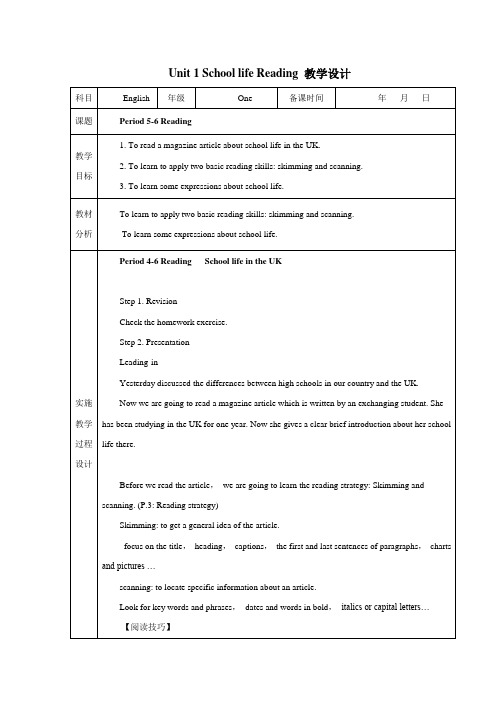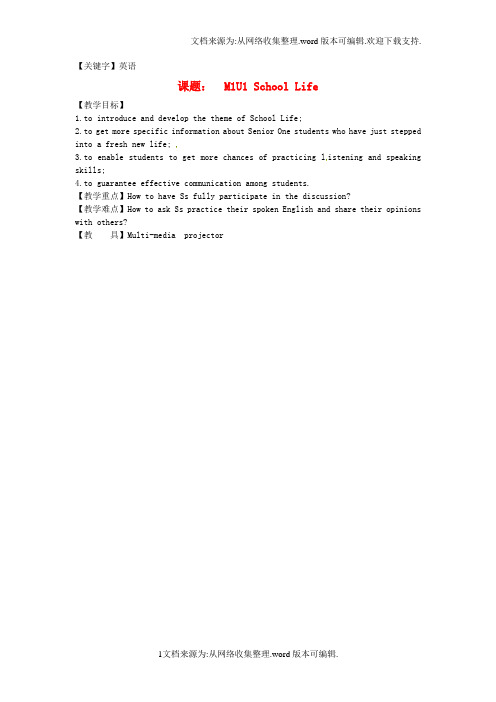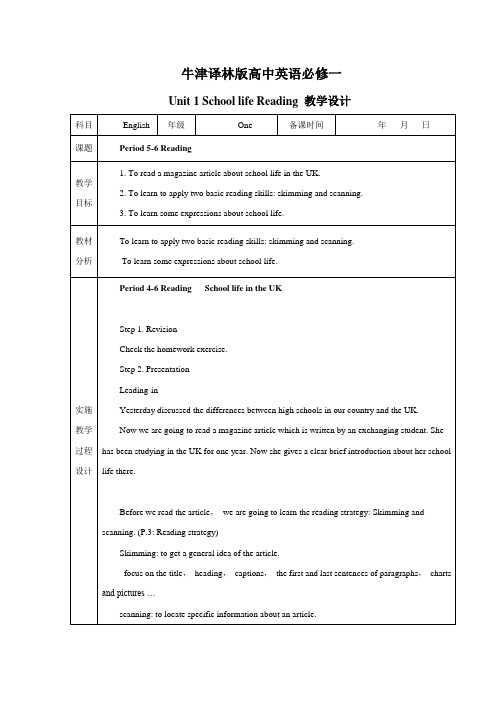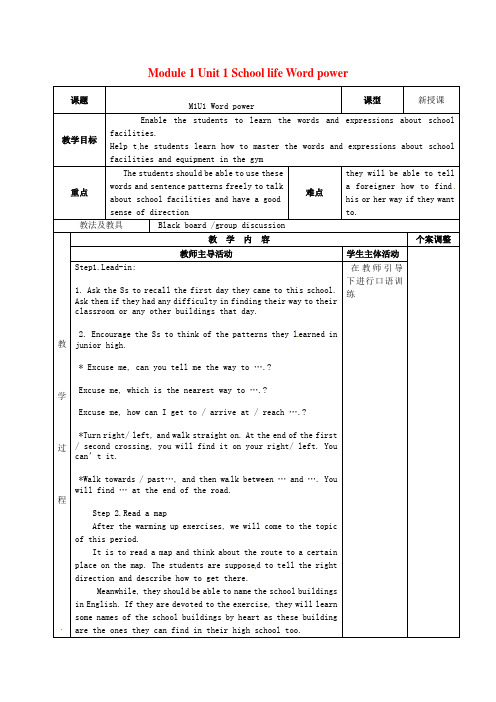牛津译林版高中英语模块1 Unit 1 School life 1 教学设计
牛津译林版英语高一上册Module 1《Unit 1 School life》word教案

I.单元教学目标The First Period ReadingThe Second Period Function and writingThe Third Period Listening and speakingThe Forth Period Language studyThe Fifth Period Integrating skillsThe Sixth Period WritingUnit 1 School life I. 单元教学目标II. 目标语言Ⅲ. 教材分析与教材重组1. 教材分析本单元以School life为话题,旨在通过单元教学使学生了解英国校园生活的一些基本情况及中英两国校园生活的不同之处;学习并能运用表示校园设施的一些基本词汇;学习定语从句的基本概念及关系代词的用法;能就校园活动的话题展开讨论;能就校园活动情况向班任老师做出报告;学习通知的写法;学会设计以介绍学校俱乐部为主题的海报等。
1.1 Welcome to the unit 部分利用四幅图片,分别从(校园风貌、生活设施、课堂教学、师生关系)四个不同的侧面介绍了英国校园生活的有关情况。
该部分还设计了三个讨论话题,引导学生对中英两国校园生活进行比较,并就相关话题发表自己的看法。
1.2 Reading部分的短文节选自一份校园杂志。
文章由一位交换留学生所写。
作者通过自己的亲身经历简要地介绍了英国学校生活的一些情况。
文章前后分别设计了五个部分的练习:前两个练习(A、B)要求学生运用本单元介绍的两种基本阅读方法(skimming and scanning)阅读文章,把握文章主旨大意,了解文中明显的细节内容;练习C1通过问题的形式考查学生对文中具体信息的把握程度;C2通过判断正误练习加深学生对阅读材料的理解;D部分为词汇练习,要求学生首先联系上下文猜测所给词汇的含义;然后通过配对练习帮助学生掌握新词的含义和用法;E部分要求学生通过运用所给词汇填空的方式完成一封英国学生写给Wei Hua的信件,以进一步加深学生对阅读内容的理解;练习F设计了两个话题,引导学生对校园生活有关话题展开讨论,以获得对文章深层次的理解。
牛津译林版高中英语模块1 Unit 1 School life Reading 教学设计

4. Preview the following lesson.)
Step 5. Practice:
Pair work
Now you are a reporter from the school magazine,and have a chance to interview Wei Hua. What other information would you like to know about her life and study in the UK?
Check the homework exercise.
Step 2. Presentation
Leading-in
Yesterday discussed the differences between high schools in our country and the UK.
Now we are going to read a magazine article which is written by an exchanging student. She has been studying in the UK for one year. Now she gives a clear brief introduction about her school life there.
focus on the title,heading,captions,the first and last sentences of paragraphs,charts and pictures …
【英语】牛津译林版高中英语必修一Unit1SchoolLifeword教案

【关键字】英语课题: M1U1 School Life【教学目标】1.to introduce and develop the theme of School Life;2.to get more specific information about Senior One students who have just stepped into a fresh new life;3.to enable students to get more chances of practicing l istening and speaking skills;4.to guarantee effective communication among students.【教学重点】How to have Ss fully participate in the discussion?【教学难点】How to ask Ss practice their spoken English and share their opinions with others?【教具】Multi-media projector【教学过程】【二次备课】Step 1 Greeting and lead-inWelcome to our English class. I’m very glad to see you here.It’s the beginning of a new team you have just finished juniorschool and are about to enter a new period in your studies.In your opinion, what do you think of your school life?School life: excitement, challenges, success, laughter’s,tears, joys, sorrows, dreams, discoveries,failures.Step2welcome to the UnitT: High school is a time of discovery, learning and hard work.You should cherish the time and makeProgress every day. I can see you’re eager to know whatstudying at senior high will be like inChina?Is it different from other countries. Let’s compare them.In the British High SchoolIn the Chinese High School1.huge campus and low-rise buildinglarge campus and tall buidings2.locker for every studentnone has such equipment3. fewer students in each class 40-50-604. at ease with teachersbe friendly to each otherstep3 DiscussionT: Discuss the three questions on page1Can you dream of your school life? ( teacher? Students?Classmates?) what characteristics should theyhave?Teachers: fair, patient, learned, humorous, co-operative,energeticStudents: diligent, e nergetic, civilized, polite,competitive, co-operate, open-minded,strong-mindedT: very good. Teachers and students should cooperate with eachotherTeacher s hould love / learn from/ encourage/ understand/help/ respectT: only in this way. Can we make progress every day and achievesuccess. How can we achieve Success?(courage, belief, luck, diligence, perseverance,intelligence,confidence, competence,cooperation, wisdom, determination)T: like a scientist bent on making a discovery, we must cherishthe hope that one day we will rewarded.Some useful saying1.Life is a bumpy road.2.where there is a will, there is a way.3.Failure is the mother of success.Step4 Language points1.High school is a time of discovery, learning and hard work.抽象名词time, means, knowledge, collection, 在具体语境中,即后面有of短语或后接一个定语从句,前面要加不定冠词a/anThere was on ce a time when I hated to go to school.have a good knowledge of English 精通英语have a large collection of coins2.What are some differences between……?参考金榜直通P2补充:tell the difference between A and B= tell A from B 3.What is your dream school like?What is sth like? 某物是什么样的?What is sb like? 某人的(性格、外貌....)是什么样的?What does sb/ sth look like?某人(某物)看起来是什么样的?How is sth?某物的质量如何?How is sb?某人的身体怎样?补充:你觉得…..怎么样?How do you like/find ……?What do you think of ……?What do you like about ……?发散:like doing/ to do 喜欢做....Would ike to do 愿意做....feel like doing 想做.....Sound like 听起来像......【作业布置】【教学后记】此文档是由网络收集并进行重新排版整理.word可编辑版本!。
牛津译林版高中英语模块1 Unit 1 School Life grammar 导学案

Module1 Unit1 School Life Grammar 导学案【学习目标】1. Learn about what an attributive clause is and the functions of relative pronouns and relative adverbs used to introduce attributive clauses. (重点理解定语从句、关系代词和副词的含义)2. Master the different usages of relative pronouns. (关系代词的用法)【学习过程】1、自学质疑——讨论:(定语从句)一、基本概念(1) 定语从句:在复合句中作定语,修饰名词或代词的从句叫定语从句。
(2) 先行词:被定语从句所修饰的名词或代词。
一般情况下,定语从句紧跟先行词。
但也有因各种原因定语从句与先行词被分割的现象。
(3) 关系代词和关系副词:定语从句的引导词。
与先行词关系密切,因此紧跟先行词,并在定语从句中充当一个成分。
关系代词有:who, whom, which, that和whose,另外,as也可充当关系代词。
关系代词在定语从句中充当主语、宾语、表语和定语。
关系副词有:when, where和why。
在定语从句中充当状语。
二、关系代词的用法1、基本用法:根据先行词的不同,和在从句中所充当的成分不同,选用不同的关系代词。
如下表:例如:(注意关系代词在定语从句中所充当的成分)①Do you know the professor who/that will give us a speech next week?(作主语)②I read a report about his new novel that/ which will soon be published. (作主语)③The plan that/which they argued about was settled at last. (作宾语)④This is the new secretary (who/whom/that) I would like to introduce to you. (作宾语)⑤The soldier whose legs were badly wounded was operated on without delay. (作定语) 注意:关系代词在定语从句中充当宾语时可以省略,充当主语时则不能。
【同课异构】高一英语(牛津译林版)必修一教案 unit1 School life welcome to the unit

Welcome to the unit 教案Step 1T: Welcome to our school.It’s the beginning of a new term. You have just finished junior high and are about to enter a new period in your studies. I am very happy to have all of you in my class and I hope we can be friends..I am your English teacher this year.First of all,allow me to introduce myself to you. My first name is Zong.So you can call me Mr Zong or Teacher Zong.I like playing computer, listening to music and reading in my free time.In a word, I like my job teaching very much.I do hope to have a good time with you.T: Just now I introduced myself to you.Now I want to ask some of you to introduce yourself to us.Any volunteers? What’s your name? S1: My name is... T: Do you have any hobbies? S2:I like ...T: Which school did you graduate from? S3:I came from No.1 Middle school.T:your name,please? S4:My name.....T:Which school are you from?S5:....active learningenjoy losing facerenew学习习惯1、课前预习课后复习不算作业,是一种习惯。
牛津译林版高中英语必修一《Unit 1 School life》 Reading 教学设计 1

Pair work
Now you are a reporter from the school magazine,and have a chance to interview Wei Hua. What other information would you like to know about her life and study in the UK?
Do any of you happen to have had the chance to go on a tour in the UK or have taken part in some exchanging programmes?Please bring some photos to school to pass them around and make brief descriptions of the photos. You can use the information to discuss the difference and try to think of the reasons for these differences.
B. what the headmaster told them sounded like what she used to hear in her school in China.
C. she was such a good cook that she liked cooking British food. D. She didn’t like History or Art,so she chose Woodwork.
Step3: Fast reading for general ideas
Unit1SchoolLife(译林牛津版高一英语必修一教案教学设计)

Unit1SchoolLife(译林牛津版高一英语必修一教案教学设计)Textual Analysis:This unit introduces and develops the theme of school life.(1) In Welcome to the unit, students are presented with four different aspects of school life in the UK and are asked to compare the differences between high schools in the UK and in China. The reading text School life in the UK deals with an article from a school magazine on school life in the UK.(2) Word power talks about school facilities;(3) In grammar and usage, students are required to learn the Attributive Clause--- the usages of “that, which, who, whose, whom”.(4) Task deals with reporting school activities. In the Project section, students will learn how to design a poster.Teaching aims:Encourage the Ss to learn the following(1) Vocabulary: words and phrases(2) Grammar: the Attributive Clause--- the usages of “that, which, who, whose, whom”(3) Skills of reading a magazine(4) Culture: school life; school activities; after-school activities; schoolclubsImportant points & difficult points:The Attributive Clause; Making a projectTeaching aids:computer; tape-recorderInteractive patterns:teacher-class; pairs; groupsTeaching methods:Audio-visual method; Direct method; Functional approach Teaching process:Welcome to the Unit: (0.5 period)(1) Warming up questions(2) Talk about the pictures(3) More questionsReading: (1.5 periods)(1) Lead-in(2) First reading(3) Further reading(4) Text Check(5) Notes/language points(6) ExercisesGrammar (task-teaching method) (2 periods)(1) explanation(2) exercisesWord power (1.5 periods)(1) text learning(2) more exercisesProject (1.5periods)(1) text learning(2) more practiceSelf-assessment (1 period)/Test (1 period)Periods:Welcome to the Unit: (0.5 period)(1) Warming up questionsa. What school were you at last term?b. Why did you choose our senior high school?c. Are there any differences?(2) Talk about the picturesa. Huge campus and low-rise buildingsb. Lockers for every studentc. Fewer students in each classd. At ease with our teacher(3) More questionsa. Do you know of any other differences between the lives of Chinese and British high school students?b. What kind of school activities do you enjoy?c. What is your dream school life like?预习专练I.请根据句意填写适当的单词1. Going to a foreign high school for some time is very ________(开心) and exciting.2. Almost no high school students are ___________ (满意)with the school hours in China.3. I know from my own ____________(经历) how difficult this kind of work can be.4. I felt lucky as all my teachers were very ___________ (有助)and I enjoyed all my subjects.5. Sometimes I played football with the boys. Sometimes I just ________ (放松)under a tree or sat on the grass.6. George Bush was invited to a__________ the APEC held in Shanghai.7. My English i_________ a lot as I used English every day and spent an hour each day reading English books in the library.8. The paintings that David d__________ to the school are being displayed in the assembly hall.9. Though it didn’t look l________ a table when it was finished, I still liked it very much.10. British people eat lots of desserts after their m_________ meal.Reading: (1.5 periods)(1)Lead-inHow long did Wei Hua stay in Britain?What was the name of Wei Hua’s class teacher?What did Wei Hua make in her Woodwork class?(2) First readingExercises: (P4)C1/C2(3) Further readingMake an interview.S1-S2(Wei Hua)Write an article about the differences between high schools in the UK and in China.(4) Text CheckGoing to ____ British high school for one year was ____ very enjoyable and exciting experience for me. I was very happy ______the school hours in Britain because school ______ around 9 a.m. and ends about 3.30p.m. This means I could get up an hour later ________ as schools in China begin before 8 a.m. On the first day, all students went to attend _______ assembly. I sat _______ a girl _______ name was Daniel.We soon became best ______. The best way ______ ____respect from the school was ______ hard and achieve high grades. This sounded ______ my school in China. I _____ many teachers in the past year and they each taught only one ________. Miss Burke was the teacher ______ taught us English literature. This is about the ________ size for British schools. We had to _______ different classrooms _____ different classes. I found the homework was not as _____ as ____I used to get in my oldschool, but it was a little ________ for me at first because all my homework was ____ English. I felt lucky as all my teachers were _________ and I enjoyed all my subjects. My English _______ a lot as I used English every day and spent an hour each day _____ English books in the library. I usually e-mailed my family and friends back home _____ at lunchtime. I also had an _____ French class ____ Tuesday evenings. Cooking was really ___ great fun as I learned how to buy, prepare and cook food. At the end of the term we ____ a class party and we all had to cook something.(5) Notes/language points重点词汇解析attend v. 参加原句在线:__________________________________________________________________ According to the law in China, all children between 6 and 14 must attend school. 根据中国法律,六到十四岁的儿童必须上学。
牛津译林版高中英语必修一Unit 1《School Life》(Word power)教案

The students should be able to use these words and sentence patterns freely to talk about school facilities and have a good sense of direction
难点
they will be able to tell a foreigner how to find his or her way if they want to.
Show the route on the map.
Then, teach ers can give the students several minutes to prepare for the description. They can be divided into several groups and talk about the route in groups. The students will be in the front before the map to present their work.
Excuse me, how can I get to /arrive at / reach….?
*Turn right/ left, and walk straight on. At the end of the first / second crossing, you will find it on your right/ left. You can’t it.
After several practice, the students are able to name some of the buildings in English. Th en we can ask them to finish part B on page 6.
- 1、下载文档前请自行甄别文档内容的完整性,平台不提供额外的编辑、内容补充、找答案等附加服务。
- 2、"仅部分预览"的文档,不可在线预览部分如存在完整性等问题,可反馈申请退款(可完整预览的文档不适用该条件!)。
- 3、如文档侵犯您的权益,请联系客服反馈,我们会尽快为您处理(人工客服工作时间:9:00-18:30)。
Senior Unit 1 School life (1) 教学设计
I.词语辨析:
1. below / under
below: 指(高度、职位、数量、年龄)在……之下”,(能力等)低于……
e.g. 100 meters below sea level,ten degrees below zero
below还可作后置定语,“下面的、以下的”
e.g. the figures below:下面的数字
under: 指“在垂直的下方”或“级别、数量、标准等低于……
e.g. Let’s sit under the tree. There are many children under 12 years of age.
2. know: 知道,明白
e.g. He knows exactly what he’s doing.
know of: 知道有,听说过……
e.g. I have never know of such a thing before.
know about: 知道……的情况,了解,知道
e.g. I know of him,but I can’t say I know much about him.
3. life / lives
一般来讲,当life 用作可数名词时,指
1)“一(几)条命”e.g. a life;
Three lives were lost in the accident.
2) 生活方式:e.g. one’s way of life;
Modern technology has changed our lives
其余情况下,life一般用作不可数名词,作“生活”解。
e.g. To him,money is his life.
Life is not easy for all of us.
4. missing / lost / gone
missing: 缺少的、失踪的、不在的
e.g. When I came back,my dictionary was missing.
There are some pages missing from the book.
注:missed:想念、错过,无“缺少的、失踪的、不在的”之意。
lost: 丢失的、迷路的、输掉的
e.g. The police are searching for the lost boy.
You’d better go to the Lost and Found to have a look.
gone: 遗失了的、无可挽回的
e.g. My youth is gone forever.
5. play / play with
play: 进行(有规则的、技巧的)体育/文艺比赛、弹奏乐器等。
e.g. Can you play tennis?Shall we play cards after dinner?
play with: 1)拿……玩,玩弄……
e.g. The boy is playing with his toys.
2) 和/与……人比赛,也可说成play sb.
e.g. I will play chess with Diana. = I’ll play Diana at chess.
6. prepare / prepare for
prepare: 准备……
e.g. Mother is busy preparing supper.
prepare for: 为……作准备
e.g. Please get reading and prepare for the test tomorrow.
preparation: make preparations (for)
7. attend / join / take part in / join in
attend: 出席(集会)、到(人多的)场合
e.g. attend a meeting (class,school,lecture….)
join: 参加团体、组织或某些人群
e.g. join the League ( the Party,Young Pioneer),join sb. in doing sth. take part in: 参加、参与(活动),成为活动的一分子
e.g. I will take part in the 1500-meter race.
join in: 参加活动
e.g. Many students joined in different activities
8. in the end: 最后,= at last,finally
to the end: ……到最后
e.g. The boy ran to the end of the 1500-metre race
by the end of…: 到……底为止(其主句一般用完成时态)
e.g. By the end of next month,we’ll have finished the repair work.
at the end of: 1) 在……结束的时候2)在……的末尾处
e.g. At the end of the meeting,the chairman made a speech.
A super market stands at the end of this road.
9. listen to / hear
listen to:听、倾听(指听的动作);hear:听到、听见(指听的结果)
e.g. Please listen to the teacher carefully in class.
Do the students at the back hear me?
We listened,but we could hear nothing.
我们常用:listen to / hear sb. do / doing sth.或listen to one’s doing sth. 句型。
